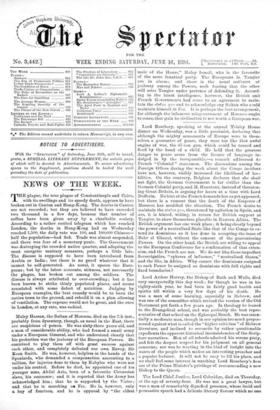Lord Rosebery, speaking at the annual Trinity House dinner on
Wednesday, was a little pessimist, declaring that although the mighty armaments of Europe were in them- selves a guarantee of peace, they were too like that awful engine of war, the 67-ton gun, which could be turned and fired by the hand of a child. He held that the greatest danger to peace arose from the licence of language in- dulged in by the irresponsible,—a remark addressed to French " Colonial " statesmen. The discussions among the Foreign Offices during the week about the Congo incident have not, however, visibly increased the likelihood of hos- tilities. On the contrary, Belgium declares that she shall not fight, the German Government is far civiller than the German Colonial party, and M. Hanotaux, instead of threaten- ing Great Britain, is arguing for hours at a time with Lord Dufferin. No hint of the French demands has as yet appeared, but there is a rumour that the death of the Emperor of Morocco has modified the situation. The French desire to maintain the status quo, threatened by agitation in Spain, and are, it is hinted, willing, in return for British support at Tangier, to show themselves placable in Eastern Africa. The British argument has one weak place ; it being clearly beyond the power of a neutralised State like that of the Congo to ex- tend its dominions as it has done in accepting the lease of
• Bahr el Ghazal, without the consent of the guaranteeing Powers. On the other hand, the British are willing to appeal to the European Conference for a confirmation of that exten- sion, and the French are not. We do not like these imperfect Sovereignties, "spheres of influence," "neutralised States," and the like, in Africa. Why cannot the dominions assigned to each Power be assigned as dominions with full rights and fixed boundaries ?


































